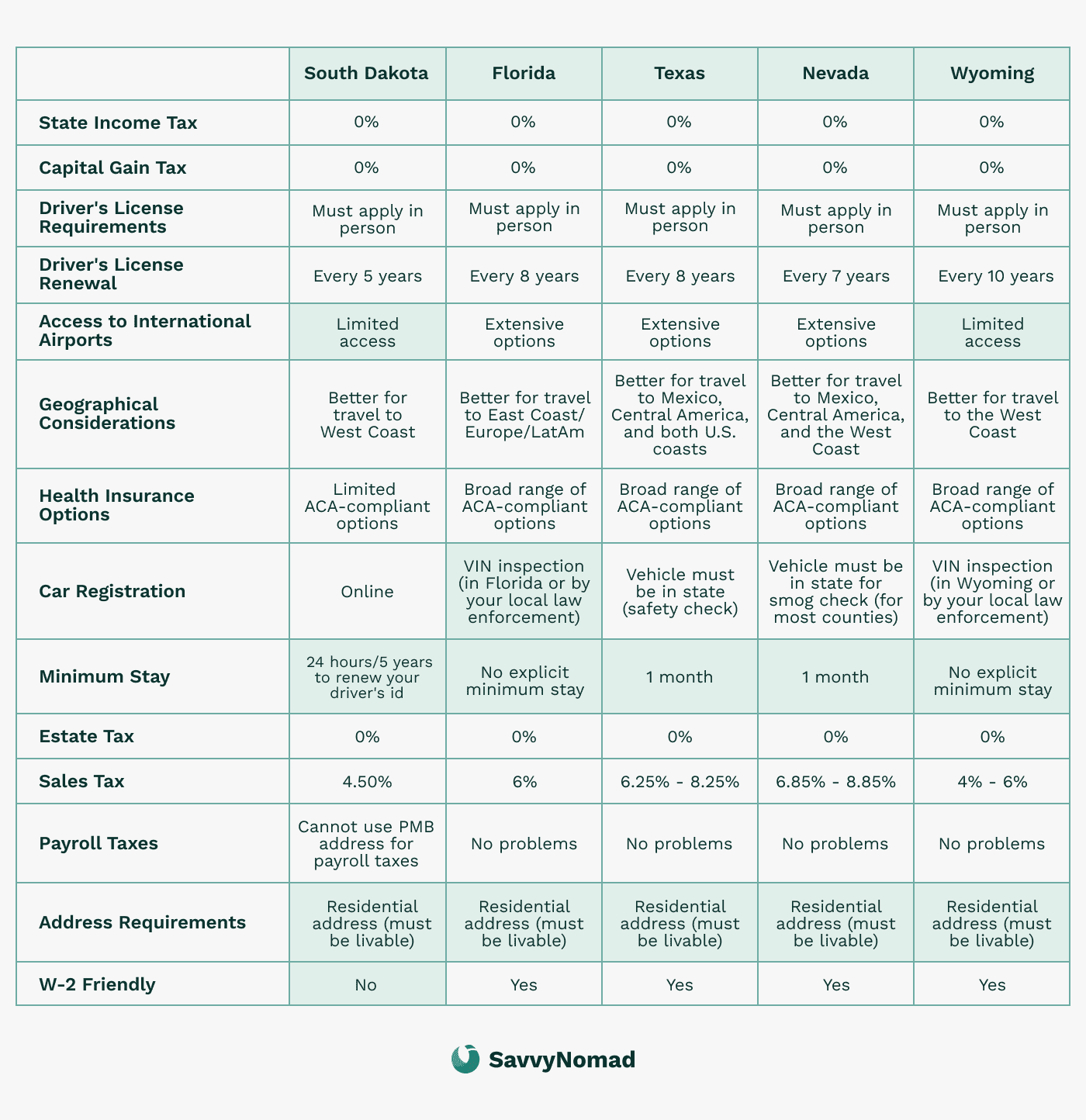How to leave Louisiana residency?

Thinking about leaving Louisiana residency? Whether you’re moving for a new job, retirement, or just seeking a change in lifestyle, it’s important to know how to officially leave Louisiana behind—especially when it comes to taxes. Louisiana has state income taxes and requires residents to report their worldwide income, so moving to a state with lower or no state income taxes, like Florida or Texas, can make a big difference in your financial situation.
This guide will walk you through the steps needed to establish a new home in another state, cut your ties with Louisiana, and handle any tax responsibilities related to Louisiana-sourced income. Whether you are looking to save on taxes or just start fresh in a new place, these steps can help you make the transition smoother and reduce the risk of problems with Louisiana taxes.
Steps to leaving Louisiana residency
Step 1: Establish a new domicile
Leaving Louisiana residency starts with creating a permanent home in your new state. It’s not just about physically moving but also showing that you intend to make the new state your primary residence.
Here’s how to get started:
1) Establish new residency
- Secure a residential address: Start by finding a place to live in your new state. Whether you’re renting or buying, this serves as the foundation for your residency claim. For example, in Florida, homeowners may qualify for tax savings through the homestead exemption.
This can be especially useful for digital nomads or expats who want a Florida documentation footprint in a tax friendly state, while recognizing that the address itself does not guarantee any particular tax outcome or acceptance by every agency or institution.
- File a Declaration of Domicile: In states like Florida, you can file a legal document stating that your new state is now your permanent home, making it official.
Residency guides:

2) Relocate your belongings
Moving your personal belongings to your new state is essential to showing that your move is genuine. Bring household items, cars, and any other important belongings to your new home.
3) Spend time in your new state
Spend as much time as possible in your new state to show that you are truly living there. Many states treat 183 days in a year as an important benchmark when deciding residency, so spending more than half the year in your new state, and clearly less time in Louisiana, helps support your new domicile.
4) Transfer IDs and vehicle registrations
Update your driver’s license and register your vehicle in your new state as soon as possible. This is one of the clearest indicators of your intent to change your residency.
5) Register to vote (if eligible)
Register to vote in your new state if you are eligible. Voter registration is a strong supporting indicator of where you live, but it is considered together with many other facts and does not by itself determine your tax residency.
6) Update financial accounts
Notify your banks, credit card companies, and other financial institutions about your new address. This helps keep your official documents and accounts consistent with your new residency.
7) Notify your employer
Let your employer know about your move, and make sure your payroll and tax withholdings reflect your new state. This helps avoid any confusion with Louisiana’s tax authorities.

Step 2: Sever ties with Louisiana
Once you have established a new home in another state, the next step is to cut significant ties with Louisiana. This shows that your move is intended to be permanent and reduces the chance that Louisiana continues to treat you as a resident for tax purposes.
Here’s how to do that:
1) Close Louisiana financial ties
- Close local bank accounts: If you have any bank accounts in Louisiana, consider closing them or transferring funds to banks in your new state. This helps show that your financial activity is no longer tied to Louisiana.
- Update personal records: Update your address with the IRS, Social Security, and any other relevant entities. Keeping all personal and financial records in your new state helps solidify your move.
2) Sell or lease property
If you own property in Louisiana, selling or leasing it out can help demonstrate that you no longer plan to live there. Long-term leases show you don’t have personal access to the property, which helps prove you’ve moved.
3) Cancel local subscriptions/services
Cancel or transfer any Louisiana-based services, like gym memberships or utility services, to your new state. Keeping them active may suggest you still have ties to Louisiana.
4) Transfer healthcare and insurance
Find new healthcare providers and update your health insurance in your new state. This is another clear indicator that you have moved your life elsewhere and plan to live there long-term.

Step 3: Time spent outside Louisiana
To successfully leave Louisiana residency, it is important to limit the amount of time you spend in the state after your move. Under Louisiana law, you are treated as a resident if you are domiciled in Louisiana, if you maintain a permanent place of abode in the state, or if you spend more than six months in Louisiana during the tax year, so day count is an important factor alongside domicile and where you actually live.
Here is how you can reduce the risk of being classified as a Louisiana resident:
183-day rule
- Stay well under six months in Louisiana: Louisiana’s tax rules treat you as a resident if you are domiciled in the state, if you maintain a permanent place of abode there, or if you spend more than six months in Louisiana during the tax year, which many people approximate as about 183 days. After you move, limiting your time in Louisiana to fewer than about 183 days a year, and clearly showing that your main home is in another state, helps support your position that you are no longer a Louisiana resident.
- Maintain travel records: It’s crucial to maintain detailed records of your time spent outside Louisiana, such as flight tickets, hotel receipts, or any other documents that can prove you were not in the state. These records will be useful if your residency is ever questioned by tax authorities.
Step 4: Louisiana-sourced income
Even after you’ve left Louisiana residency, you may still have ongoing tax responsibilities if you’re earning income from sources within the state. Here’s how to manage that:
1) Ongoing tax responsibilities
If you continue to earn income from Louisiana, such as rental income, business profits, or wages, you will need to file non-resident tax returns. Non-resident returns are structured so that only income from Louisiana sources is taxed, while the rest of your income is not taxed by Louisiana.
2) Rental or business income
If you own rental properties or businesses in Louisiana, the income generated will continue to be subject to Louisiana taxes even after you establish residency elsewhere. It is a good idea to work with a tax professional to handle the complexities of filing and to help you meet all of your tax obligations.





